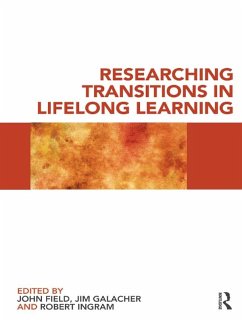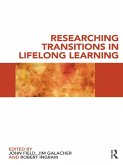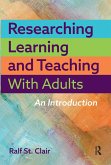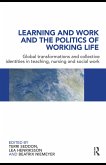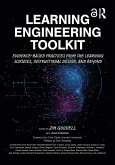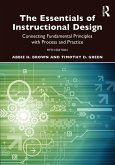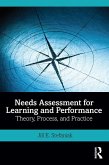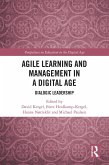Researching Transitions in Lifelong Learning (eBook, ePUB)
Redaktion: Field, John; Ingram, Robert; Gallacher, Jim
44,95 €
44,95 €
inkl. MwSt.
Sofort per Download lieferbar

22 °P sammeln
44,95 €
Als Download kaufen

44,95 €
inkl. MwSt.
Sofort per Download lieferbar

22 °P sammeln
Jetzt verschenken
Alle Infos zum eBook verschenken
44,95 €
inkl. MwSt.
Sofort per Download lieferbar
Alle Infos zum eBook verschenken

22 °P sammeln
Researching Transitions in Lifelong Learning (eBook, ePUB)
Redaktion: Field, John; Ingram, Robert; Gallacher, Jim
- Format: ePub
- Merkliste
- Auf die Merkliste
- Bewerten Bewerten
- Teilen
- Produkt teilen
- Produkterinnerung
- Produkterinnerung

Bitte loggen Sie sich zunächst in Ihr Kundenkonto ein oder registrieren Sie sich bei
bücher.de, um das eBook-Abo tolino select nutzen zu können.
Hier können Sie sich einloggen
Hier können Sie sich einloggen
Sie sind bereits eingeloggt. Klicken Sie auf 2. tolino select Abo, um fortzufahren.

Bitte loggen Sie sich zunächst in Ihr Kundenkonto ein oder registrieren Sie sich bei bücher.de, um das eBook-Abo tolino select nutzen zu können.
Researching Transitions in Lifelong Learning presents new research from Britain, Australia and North America. The authors include leading scholars with established international reputations - such as Kathryn Ecclestone, Norton Grubb, David Boud and Gert Biesta - as well as emerging researchers with fresh and sometimes challenging perspectives.
- Geräte: eReader
- mit Kopierschutz
- eBook Hilfe
- Größe: 0.64MB
Andere Kunden interessierten sich auch für
![Researching Transitions in Lifelong Learning (eBook, PDF) Researching Transitions in Lifelong Learning (eBook, PDF)]() Researching Transitions in Lifelong Learning (eBook, PDF)45,95 €
Researching Transitions in Lifelong Learning (eBook, PDF)45,95 €![Researching Learning and Teaching with Adults (eBook, ePUB) Researching Learning and Teaching with Adults (eBook, ePUB)]() Ralf St. ClairResearching Learning and Teaching with Adults (eBook, ePUB)36,95 €
Ralf St. ClairResearching Learning and Teaching with Adults (eBook, ePUB)36,95 €![Learning and Work and the Politics of Working Life (eBook, ePUB) Learning and Work and the Politics of Working Life (eBook, ePUB)]() Learning and Work and the Politics of Working Life (eBook, ePUB)45,95 €
Learning and Work and the Politics of Working Life (eBook, ePUB)45,95 €![Learning Engineering Toolkit (eBook, ePUB) Learning Engineering Toolkit (eBook, ePUB)]() Learning Engineering Toolkit (eBook, ePUB)37,95 €
Learning Engineering Toolkit (eBook, ePUB)37,95 €![The Essentials of Instructional Design (eBook, ePUB) The Essentials of Instructional Design (eBook, ePUB)]() Abbie H. BrownThe Essentials of Instructional Design (eBook, ePUB)65,95 €
Abbie H. BrownThe Essentials of Instructional Design (eBook, ePUB)65,95 €![Needs Assessment for Learning and Performance (eBook, ePUB) Needs Assessment for Learning and Performance (eBook, ePUB)]() Jill E. StefaniakNeeds Assessment for Learning and Performance (eBook, ePUB)41,95 €
Jill E. StefaniakNeeds Assessment for Learning and Performance (eBook, ePUB)41,95 €![Agile Learning and Management in a Digital Age (eBook, ePUB) Agile Learning and Management in a Digital Age (eBook, ePUB)]() Agile Learning and Management in a Digital Age (eBook, ePUB)36,95 €
Agile Learning and Management in a Digital Age (eBook, ePUB)36,95 €-
-
-
Researching Transitions in Lifelong Learning presents new research from Britain, Australia and North America. The authors include leading scholars with established international reputations - such as Kathryn Ecclestone, Norton Grubb, David Boud and Gert Biesta - as well as emerging researchers with fresh and sometimes challenging perspectives.
Dieser Download kann aus rechtlichen Gründen nur mit Rechnungsadresse in A, B, BG, CY, CZ, D, DK, EW, E, FIN, F, GR, HR, H, IRL, I, LT, L, LR, M, NL, PL, P, R, S, SLO, SK ausgeliefert werden.
Produktdetails
- Produktdetails
- Verlag: Taylor & Francis eBooks
- Seitenzahl: 240
- Erscheinungstermin: 3. Juni 2009
- Englisch
- ISBN-13: 9781134005567
- Artikelnr.: 38257954
- Verlag: Taylor & Francis eBooks
- Seitenzahl: 240
- Erscheinungstermin: 3. Juni 2009
- Englisch
- ISBN-13: 9781134005567
- Artikelnr.: 38257954
- Herstellerkennzeichnung Die Herstellerinformationen sind derzeit nicht verfügbar.
John Field is Professor of Lifelong Learning at the University of Stirling and co-director of the Centre of Research in Lifelong Learning, Glasgow Caledonian University. He is author of Social Capital (Routledge, 2003) and co-editor of Lifelong Learning: Education across the lifespan (Routledge, 2000). Jim Gallacher is Emeritus Professor of Lifelong Learning, Centre for Research in Lifelong Learning, Glasgow Caledonian University. He is author of Researching Widening Access to Lifelong Learning: Issues and approaches in international research (Routledge, 2004) and Learning Outside the Academy (Routledge, 2006). Robert Ingram is a Research Fellow at the Centre for Research in Lifelong Learning, Glasgow Caledonian University. He is a political scientist who has worked on a number of studies in lifelong learning policy, and he has published a number of research papers.
1. Troubling transitions: learning and the changing life course PART I:
THEMES, METHODS AND CONCEPTS 2. Lost and found in transition: the
implications of 'identity', 'agency' and 'structure' for educational goals
and practices 3. A View of Canadian Lifelong-Learning Policy Culture
through a Critical Lens 4. Time, Individual Learning Careers, and Lifelong
Learning 5. Who Is The 'Responsible Learner'? Viewing learning careers
through social narratives and recursive methodology 6. Older men's lifelong
learning: common threads/sheds 7. Biography, Transition and Learning in the
Lifecourse: The role of narrative PART II: CHANGING PLACES OF LEARNING 8.
Approaches to Lifelong Learning: American Community Colleges and age
inclusiveness 9. Two conceptual models for facilitating learners'
transitions to new post-school learning contexts 10. Worlds of difference:
'dual sector' institutions and higher education transitions 11. Improving
Transfer from Vocational to Higher Education: International lessons 12.
Imagined transitions: social and organisational influences on the student
life-cycle 13. Accumulating knowledge in researching technology enhanced
learning: going with the flows PART III: TRANSITIONS THROUGH WORKING LIFE
14. Working out work: integrated development practices in organisations 15.
"Drifting", "desperate" or just "diverse"? Researching young people in jobs
without training 16. The limits of competency-based training and the
implications for work 17. "Well, if the government won't do it, we bloody
well will!" Third Age Activism and Participatory Action Learning 18.
Researching Transitions: trends and future prospects
THEMES, METHODS AND CONCEPTS 2. Lost and found in transition: the
implications of 'identity', 'agency' and 'structure' for educational goals
and practices 3. A View of Canadian Lifelong-Learning Policy Culture
through a Critical Lens 4. Time, Individual Learning Careers, and Lifelong
Learning 5. Who Is The 'Responsible Learner'? Viewing learning careers
through social narratives and recursive methodology 6. Older men's lifelong
learning: common threads/sheds 7. Biography, Transition and Learning in the
Lifecourse: The role of narrative PART II: CHANGING PLACES OF LEARNING 8.
Approaches to Lifelong Learning: American Community Colleges and age
inclusiveness 9. Two conceptual models for facilitating learners'
transitions to new post-school learning contexts 10. Worlds of difference:
'dual sector' institutions and higher education transitions 11. Improving
Transfer from Vocational to Higher Education: International lessons 12.
Imagined transitions: social and organisational influences on the student
life-cycle 13. Accumulating knowledge in researching technology enhanced
learning: going with the flows PART III: TRANSITIONS THROUGH WORKING LIFE
14. Working out work: integrated development practices in organisations 15.
"Drifting", "desperate" or just "diverse"? Researching young people in jobs
without training 16. The limits of competency-based training and the
implications for work 17. "Well, if the government won't do it, we bloody
well will!" Third Age Activism and Participatory Action Learning 18.
Researching Transitions: trends and future prospects
1. Troubling transitions: learning and the changing life course PART I:
THEMES, METHODS AND CONCEPTS 2. Lost and found in transition: the
implications of 'identity', 'agency' and 'structure' for educational goals
and practices 3. A View of Canadian Lifelong-Learning Policy Culture
through a Critical Lens 4. Time, Individual Learning Careers, and Lifelong
Learning 5. Who Is The 'Responsible Learner'? Viewing learning careers
through social narratives and recursive methodology 6. Older men's lifelong
learning: common threads/sheds 7. Biography, Transition and Learning in the
Lifecourse: The role of narrative PART II: CHANGING PLACES OF LEARNING 8.
Approaches to Lifelong Learning: American Community Colleges and age
inclusiveness 9. Two conceptual models for facilitating learners'
transitions to new post-school learning contexts 10. Worlds of difference:
'dual sector' institutions and higher education transitions 11. Improving
Transfer from Vocational to Higher Education: International lessons 12.
Imagined transitions: social and organisational influences on the student
life-cycle 13. Accumulating knowledge in researching technology enhanced
learning: going with the flows PART III: TRANSITIONS THROUGH WORKING LIFE
14. Working out work: integrated development practices in organisations 15.
"Drifting", "desperate" or just "diverse"? Researching young people in jobs
without training 16. The limits of competency-based training and the
implications for work 17. "Well, if the government won't do it, we bloody
well will!" Third Age Activism and Participatory Action Learning 18.
Researching Transitions: trends and future prospects
THEMES, METHODS AND CONCEPTS 2. Lost and found in transition: the
implications of 'identity', 'agency' and 'structure' for educational goals
and practices 3. A View of Canadian Lifelong-Learning Policy Culture
through a Critical Lens 4. Time, Individual Learning Careers, and Lifelong
Learning 5. Who Is The 'Responsible Learner'? Viewing learning careers
through social narratives and recursive methodology 6. Older men's lifelong
learning: common threads/sheds 7. Biography, Transition and Learning in the
Lifecourse: The role of narrative PART II: CHANGING PLACES OF LEARNING 8.
Approaches to Lifelong Learning: American Community Colleges and age
inclusiveness 9. Two conceptual models for facilitating learners'
transitions to new post-school learning contexts 10. Worlds of difference:
'dual sector' institutions and higher education transitions 11. Improving
Transfer from Vocational to Higher Education: International lessons 12.
Imagined transitions: social and organisational influences on the student
life-cycle 13. Accumulating knowledge in researching technology enhanced
learning: going with the flows PART III: TRANSITIONS THROUGH WORKING LIFE
14. Working out work: integrated development practices in organisations 15.
"Drifting", "desperate" or just "diverse"? Researching young people in jobs
without training 16. The limits of competency-based training and the
implications for work 17. "Well, if the government won't do it, we bloody
well will!" Third Age Activism and Participatory Action Learning 18.
Researching Transitions: trends and future prospects
